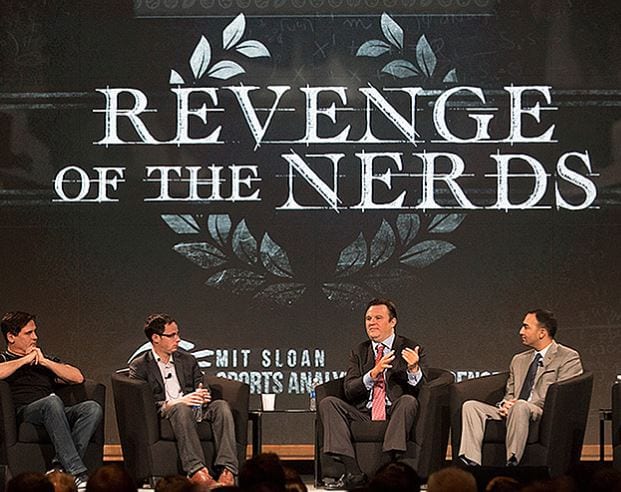by Kirk Wakefield – August 2014
Back in the early 1990’s, I started out with my Baseball Almanac contacting major and minor league teams to conduct research. Being at Ole Miss during that time, just an hour south of Memphis, I made quick friends with every pro franchise that came through town–among them the Memphis Chicks, Memphis MadDogs (CFL), Memphis Fire (USBL), and Memphis Redbirds, where I managed their fan research for three summers before leaving for Baylor in 2002.
During the ’90s, I recall a visit with a vice-president of marketing at a MLB team in the northeast about collaborating on fan research. He thought it was all very interesting, but said they weren’t interested because, “We already did one fan survey this year.”
Times have changed and MLBAM has taken the league and its teams to the front of the class in understanding its fans. However, one paradox I learned still holds today:
[dropshadowbox align=”center” effect=”lifted-both” width=”300px” height=”” background_color=”#ffffff” border_width=”1″ border_color=”#dddddd” ]
The best organizations always want to know more and the struggling rarely want help.[/dropshadowbox]
Why do the best get better?

Everyone who’s read “Good to Great” knows that the best leaders have an intense drive coupled with humility. This combination is what makes any leader get better because first they want to and second they know they don’t have a corner on knowledge. Derek Blake, Vice President, Partnership Marketing, La Quinta Inns & Suites, demonstrates this kind of leadership. Derek shares how this plays out in working with educators,
Business today is always evolving and we want to be on the cutting edge. Working with academics who are experts in a very specific field of study – like corporate partnerships – just makes sense. By giving back to our educational institutions, we help build the foundation of who students become in the future and that’s where we all benefit.
Some of the greatest franchises in the world are literally right up or down the road from us here in Waco and they always want to learn more. Some might think the San Antonio Spurs have accomplished all they need to after five NBA titles and operating above 99% attendance capacity. But from the top to the bottom of that organization, they always want to get better and are always open to new ideas, new methods, and new approaches to satisfy and grow the fan base.

The Dallas Cowboys are the NFL’s most valuable franchise, but their executives never hesitate to explore new ideas and to partner with us on research and classroom projects. Eric Sudol, Sr. Director, Corporate Partnerships Sales & Service at Dallas Cowboys, adds, “Teams are always busy and we can save time and money by partnering with academics when our interests overlap with their research needs.”
Much the same can be said of Baylor’s other partners around the state, both corporate and sports organizations. Further, aggressive teams like the Padres, Browns, Chiefs, and Dolphins work with us to take an innovative partnership approach with corporate sponsors to provide valid measures of sponsorship returns.
Why (not) work with academics?

ESPN and the Sports Analytics Conference partner with MIT. Wharton’s Consumer Analytics Initiative (WCAI) works with a variety of corporate partners (see right) and also works with sports teams. Yet, some corporate and sports organizations are hesitant to engage with academics.
Hey, I get it, we’re a little weird. Some of us are a lot weird. There’s a reason the Sloan Sports Analytics Conference is called a “nerdfest” and hosts a panel entitled, “Revenge of the Nerds.” But, for the fearful, here are three reasons you should work with academics:
- Focus. At research institutions like MIT, Wharton, and Baylor, faculty are experts in very specific fields. Aside from service responsibilities, typical workload is 50% research & 50% teaching. We spend 2-4 days a week, about 50 weeks a year, often for many years focused on finding out what’s new in one or two areas–which leads to the next point.
- Innovation. Academics are rewarded for publishing research. Research gets published (ideally) only when we learn something new. In contrast, syndicated research firms are rewarded for standardizing and commercializing past practices.
- Confidentiality. If you read the Sports Business Journal and popular press, you might think academics will want to publish the name of the team, the executives, and specific financial or customer data. In sharp contrast, academics do the opposite for two big reasons:
- Research is published when it’s generalizable to other situations. Sports is just the laboratory to study interesting phenomenon. We often don’t state the specific team or location because then someone would say it might not apply elsewhere.
- Research is based on the relationship between variables or fields in a data set–not the levels. In other words, we care about the relationship between X and Y, not the levels of X and Y. So, if you had data on fan demos and expenditures, we don’t care about the amounts–we care about how much variable X (e.g., tickets used) influences variable Y (e.g., renewals). What we report is the strength of relationships.
- Expense. What academics need most is data. If you can provide access to data, most academics will trade time for cool data. Obviously, our institutions and programs need support so we can conduct research and teach the future business leaders of the world. Partners understand that (e.g., WCAI, above), of course. But, essentially, all we need is access.
And we thank you for your support.

